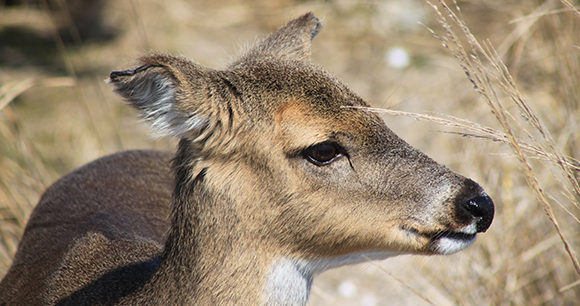
Patchogue, NY—The Animal Welfare Institute and Wildlife Preserves, Inc. filed a lawsuit today against K. Christopher Soller, superintendent of Fire Island National Seashore (FINS), and the National Park Service (NPS). The complaint alleges that, by implementing a wildlife management plan that authorizes the killing of white-tailed deer on FINS, Soller and the NPS have broken federal law and violated property rights.
According to the complaint, authorizing the killing of deer within FINS by sharpshooting, public hunting, and capture and euthanasia violates the following:
- Deed Restrictions. In June 1955, Wildlife Preserves transferred ownership of multiple areas—known as the WP Tracts—to nonprofit Sunken Forest Preserve, Inc. This “1955 Deed” stated that the WP Tracts must be maintained in their natural state and used as a wildlife sanctuary.
In 1966, Sunken Forest Preserve transferred the WP Tracts to the NPS for inclusion in the recently established FINS. This “1966 Deed” contained the same deed restrictions as the 1955 Deed, stipulating that these donated properties should “be maintained in their natural state and operated solely as a sanctuary and preserve for the maintenance of wild life, and its natural habitat, undisturbed by hunting, trapping, fishing or any other activities that might adversely affect the environment or the flora or fauna of said premises.”
The culling of deer within the WP Tracts and other actions authorized by the NPS’s plan thus violates the deed restrictions. According to the deeds, a violation of this nature triggers an immediate reversion of the WP Tracts to Wildlife Preserves’ ownership. - The National Environmental Policy Act (NEPA). Under NEPA, governmental agencies—like the NPS—are required to take a “hard look” at the environmental impacts of any major federal action and consider reasonable and feasible alternatives to its proposed action, including a no action alternative. Failing to take a “hard look” or to consider reasonable alternatives to lethal deer population control violates NEPA.
“The National Park Service’s decision to allow the slaughter of hundreds of deer blatantly violates the deed restrictions for this land, which require that it be kept as a wildlife sanctuary,” said Tara Zuardo, wildlife attorney with the Animal Welfare Institute. “The agency’s haphazard culling of deer is an outright breach of the law and a waste of tax dollars.”
“The NPS has admitted that the restrictions in the 1955 and 1966 deeds are valid and applicable to the WP Tracts,” said Catherine Pastrikos Kelly of Meyner and Landis LLP and counsel to the plaintiffs. “Nonetheless, the NPS has implemented the killing of white-tailed deer on the WP Tracts, among other actions, which we believe plainly violate the deed restrictions. We are grateful to the local Fire Island residents and the Fire Island Wildlife Foundation, Inc. for their initial public outcry in response to the NPS’s plan and for their support of this action."
To read the full complaint, visit https://awionline.org/sites/default/files/press_release/files/AWI-WL-FireIsland-FiledComplaint-11292017.pdf.
Amey Owen, (202) 446-2128, [email protected]
About the Animal Welfare Institute
The Animal Welfare Institute (www.awionline.org) is a nonprofit charitable organization founded in 1951 and dedicated to reducing animal suffering caused by people. AWI engages policymakers, scientists, industry, and the public to achieve better treatment of animals everywhere—in the laboratory, on the farm, in commerce, at home, and in the wild. For more information, visit www.awionline.org.
About Wildlife Preserves, Inc.
Wildlife Preserves, Inc. is a private, nonprofit land conservation corporation dedicated to the preservation of natural areas, open space, wildlife, and wildlife habitats for conservation, education, and research. Wildlife Preserves owns and manages approximately 6,000 acres of land in the State of New Jersey in the counties of Atlantic, Cumberland, Essex, and Morris. Wildlife Preserves also owns land in Westchester County, New York. For more information, visit http://wildlifepreserves.org/.